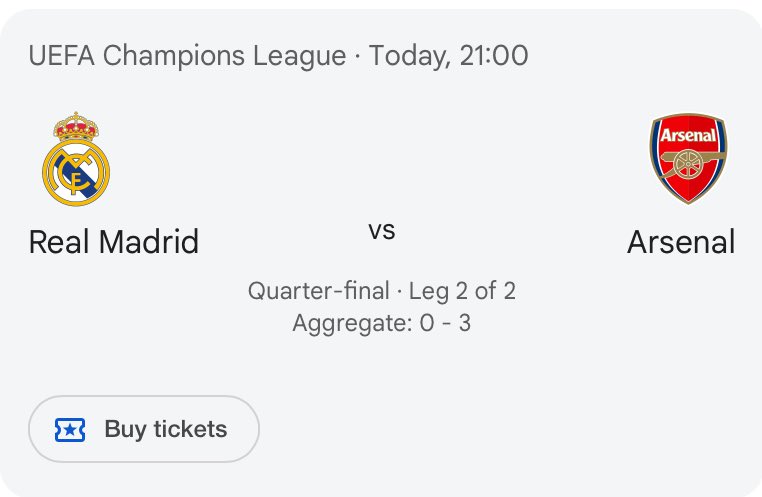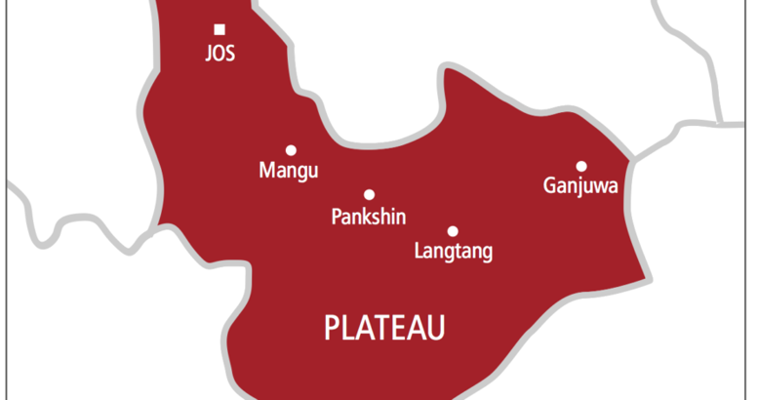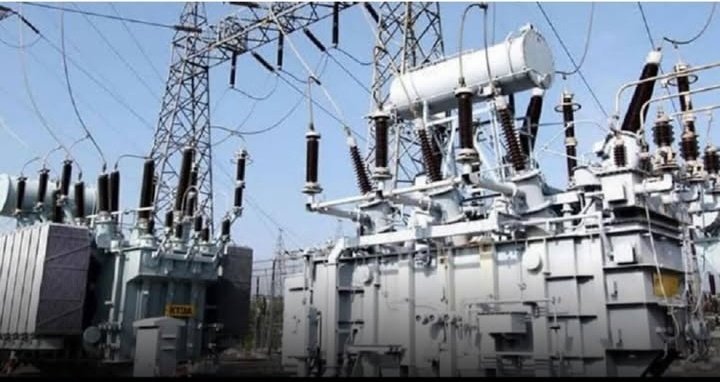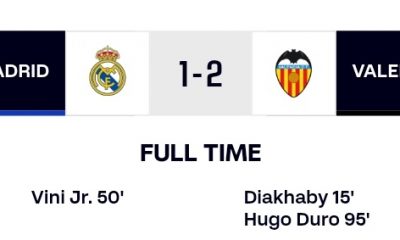News
Arsenal vs Real Madrid: Who Will Reign Supreme?

Arsenal vs Real Madrid: Champions League Clash Set to Ignite
One of the most eagerly awaited matchups in this season’s Champions League is just around the corner as Arsenal get ready to take on Real Madrid. After a dominant 3-0 win in the first leg, Arsenal go into the return fixture with a strong advantage and are widely seen as favorites to advance.
But with Real Madrid, nothing is ever certain. The Spanish giants have built a reputation for epic comebacks on Europe’s biggest stage, and the word “remontada” is already making the rounds. Players like Jude Bellingham have expressed their belief in turning the tie around, leaning on the club’s proud history of defying the odds.
Tensions are running high, not just on the pitch but off it too. Arsenal fans are caught between hope and nerves, while Madrid supporters are rallying behind their team with confident talk and spirited social media banter. It all adds to the buzz surrounding what’s shaping up to be a truly electric night of football.
This isn’t just a game — it’s a battle of mental strength, legacy, and belief.
News
The Plateau Killings: Nigeria’s Heartland in Crisis

For years, Plateau State—nestled in Nigeria’s North-Central region—has been a place of both breathtaking beauty and heartbreaking violence. Lately, however, it’s the bloodshed that’s been impossible to ignore. A relentless wave of attacks over recent weeks has left dozens dead, thousands displaced, and an entire nation once again grappling with the reality of a security system struggling to keep up.
The violence, often chalked up to communal tensions or criminal gangs, is far more complex than any single explanation can capture. As communities mourn and survivors pick up the pieces, questions mount: Why does this keep happening? And what is being done to stop it?
A Bloody April
The first week of April 2025 saw a chilling escalation. Armed attackers stormed several villages in Bokkos Local Government Area—Hurti, Josho, and Daffo among them—leaving at least 40 people dead and razing close to 400 homes. Nearly 1,000 residents fled, adding to the state’s swelling population of internally displaced persons.
The violence didn’t stop there. On April 13, a father and his two sons were murdered in their sleep in Zogu village, Bassa LGA. Just a day later, 51 more lives were claimed in the nearby Zike community, all within a span of hours. That attack came hot on the heels of another massacre in Bokkos, where 52 people were killed and around 2,000 forced from their homes.
By mid-April, the death toll had surpassed 100 in a single week. Among the dead and missing were students, including those from Plateau State University. The National Association of Nigerian Students (NANS) and the Christian Association of Nigeria (CAN) both condemned the killings, calling them an affront to humanity.
More Than Just Farmer vs. Herder
Too often, violence in the Middle Belt gets brushed off as just another round in the long-running farmer-herder conflict. But leaders in Plateau—and beyond—are pushing back on that narrative.
Governor Caleb Mutfwang has openly called the attacks “genocidal” and “sponsored,” rejecting the simplistic farmer-herder framing. Former Governor Jonah Jang was even more direct, blaming a “known group with a hidden agenda” for what he called a systematic campaign of terror.
The truth is messier. Plateau sits at the crossroads of Nigeria’s ethnic and religious identities. Indigenous Christian farming communities and Muslim Fulani herders have a long, troubled history marked by land disputes, cultural friction, and deep-seated mistrust. But these latest killings appear to go beyond old rivalries.
The Crisis Within the Crisis
Ethnic and Religious Tensions: The region’s diversity, while rich, also fuels division. Attacks often target specific ethnic groups, raising fears of ethnic cleansing.
Criminal Exploitation: Armed groups—some branded bandits, others terrorists—have capitalized on the chaos, using it as cover for looting, kidnapping, and murder.
Security Failures: Critics, including former Vice President Atiku Abubakar, have lambasted the federal government for repeated lapses. Amnesty International has demanded a full probe into why violence persists despite heavy military presence.
Socioeconomic Struggles: With poverty and unemployment rampant, especially in rural areas, extremist groups find easy recruits among disillusioned youth.
Responses: Promises and Pressure
The latest attacks have drawn swift—if familiar—responses from both state and federal authorities.
President Bola Tinubu condemned the violence and ordered a crackdown, while the National Emergency Management Agency (NEMA) began distributing aid. Two suspects were arrested by April 16, and the Inspector-General of Police deployed tactical units to the hardest-hit areas.
Still, for many Plateau residents, words and deployments are no longer enough.
NANS has called for relocating military command to the state, while civil groups like the Northern CAN and the Arewa Consultative Forum are demanding a long-term, inclusive solution. Governor Mutfwang, for his part, is urging unity and pledging justice—while warning against divisive rhetoric that pits communities against one another.
What Now?
Plateau’s agony is a mirror held up to Nigeria’s broader security dilemma. The country currently ranks sixth on the 2025 Global Terrorism Index. Analysts warn that unless Nigeria commits to deep structural reform—fixing its security apparatus, promoting equitable development, and fostering genuine political inclusion—these tragedies will keep repeating.
The stories from the ground are gut-wrenching. Villages like Ruwi, Mangor, and Hurti are not just names on a map—they’re homes, now reduced to ashes. Survivors are living with trauma, grief, and a gnawing uncertainty about what tomorrow might bring.
As the world watches, one thing is clear: the people of Plateau State deserve more than just sympathy. They deserve peace—and the unwavering political will to make it a reality.
Sources: Punch Newspapers, Reuters, Daily Trust, HumAngle, NBC News, Vanguard News, Channels TV, Arise TV.
News
CBEX Scandal: $822 Million Allegedly Moved to Private ETH Wallet Amid Platform’s Collapse

In a bombshell revelation that’s rocked Nigeria’s crypto scene, allegations have surfaced that an administrator of CBEX—a once-popular digital asset trading platform—transferred a jaw-dropping $822 million (over 1 trillion Naira) into a private Ethereum wallet. The reports, which emerged on April 15, 2025, have sparked widespread panic and fueled fears that the platform is in full-blown collapse.
Allegations Spark Panic
The controversy exploded after users on X (formerly Twitter) began sharing claims that a CBEX admin had quietly moved the massive sum, igniting outrage across the community. One viral post summed up the mood: “CBEX run people street o!”—a Nigerian phrase implying investors were duped. Although the allegations haven’t been officially confirmed, they’ve only added fuel to growing suspicions that something was amiss with the platform.
According to local media, CBEX promised unrealistic returns—up to 100% profit within 30 days. On April 14, just one day before the massive transfer was reported, the platform suddenly crashed. Users found themselves locked out of their accounts, with many turning to social media to share emotional videos, claiming they’d lost everything. Some estimates peg total losses at over 1.3 trillion Naira.
Warning Signs Were There
Red flags had been waving for days. On April 11, users began sounding alarms on X, suggesting CBEX might be a Ponzi scheme. One user shared how someone allegedly turned a $1,000 investment into $5,000—a classic sign of a high-risk, unsustainable payout model. Despite these concerns, defenders of CBEX argued the platform was merely experiencing delays and would resume operations on April 15.
But the Nigerian Securities and Exchange Commission (SEC) had already labeled CBEX an unregistered and illegal entity, violating local financial laws. Experts noted the platform’s website bore an uncanny resemblance to legitimate exchanges like ByBit, possibly to deceive users. Investigators believe funds deposited into CBEX were funneled through Tron (TRX), converted to USDT, and then moved to Ethereum, suggesting an attempt to cover the money trail.
$822 Million Transfer: Real or Rumor?
So far, there’s no on-chain data to confirm the alleged $822 million transfer. No wallet address or transaction ID has been linked to the claim, leading some to question its authenticity. Still, the timing—coinciding with CBEX’s crash—has seen credibility to the theory among anxious investors.
If true, it would rank as one of the biggest crypto-related frauds Nigeria has ever seen. For context, Singapore reported $822 million in total scam losses for all of 2024—with crypto scams accounting for about 25%. That one Nigerian platform could allegedly move that amount is staggering.
Rage on the Ground and Silence from CBEX
On the streets, the backlash has been intense. In Ibadan, furious investors reportedly stormed a CBEX office, looting furniture, electronics, and even solar panels in a desperate attempt to reclaim losses. Online, X has become a war zone of accusations, grief, and demands for justice. Through it all, CBEX has remained conspicuously silent.
Some users who reached out through Telegram said they received vague or dismissive responses. The platform’s earlier claim of holding a Money Services Business (MSB) license—once flaunted as proof of legitimacy—is now widely seen as meaningless.
A Wake-Up Call for Nigeria’s Crypto Space
The CBEX crisis is unfolding amid a broader crackdown on unlicensed crypto operators in Nigeria. The SEC’s actions reflect rising concern about fraud in the largely unregulated digital asset space. If CBEX is indeed a scam, the fallout could deal a serious blow to public confidence—even as reputable exchanges like ByBit and BitMart continue global operations.
Globally, crypto markets have been volatile. Ethereum, reportedly the network used in the alleged CBEX transfer, has dropped nearly 30% this month, now hovering around $1,400. Earlier this year, ByBit itself was targeted in a $1.46 billion ETH wallet heist, highlighting the broader risks facing the industry.
What Now for CBEX Investors?
Unfortunately, the road ahead looks bleak for CBEX users. Without clear regulatory backing or a recovery plan, getting their money back may be a long shot. Experts urge affected individuals to gather all transaction records and communication logs in case legal action becomes viable.
CBEX’s downfall serves as a harsh lesson about the dangers of too-good-to-be-true promises in the crypto world. As one X user bluntly put it: “You must learn a lesson.”
For now, Nigeria’s crypto community is left reeling—waiting for answers, accountability, and a path forward that may never come.
Disclaimer: The $822 million transfer has not been independently verified. Readers are advised to treat such claims with caution until confirmed by reliable sources.
Sources:
BBC News, April 15, 2025
Punch Newspapers, April 15, 2025
Medium, April 15, 2025
Punch Newspapers, April 11–13, 2025
Yahoo News, February 25, 2025
Bleeping Computer, February 21, 2025
Posts on X, April 15, 2025
News
Nationwide Blackout Threatens as Power Companies Warn of Shutdown Over N4 Trillion Government Debt

Nigeria could soon face a nationwide blackout as power generation companies (GenCos) warn they may be forced to shut down operations over an outstanding N4 trillion debt owed by the federal government.
In a statement released Monday, Colonel Sani Bello, Chairman of the Board of Trustees for the Association of Power Generation Companies (APGC), said the GenCos are currently owed N2 trillion for electricity supplied in 2024 alone, on top of N1.9 trillion in legacy debts.
The companies say they receive less than 30% of payments for the electricity they supply to the national grid each month, making it increasingly difficult to stay afloat.
“The power generation companies are bearing the brunt of the ongoing liquidity crisis in Nigeria’s electricity sector,” the statement said. “Despite significant investments to increase capacity, GenCos are still struggling with systemic challenges, poor policy implementation, and a growing debt burden — all without a clear plan for repayment.”
They warned that if the financial pressure continues unchecked, it could lead to a total collapse of the power supply chain, resulting in blackouts across the country.
The GenCos noted that payment collections for 2024 have dropped below 30%, with no signs of improvement heading into 2025. They also highlighted other compounding issues, including excessive taxes, high regulatory fees, and currency instability, all of which are further eroding their finances.
Despite continuing to supply electricity since the Partial Activation of Contracts began in July 2022, the companies claim they are not receiving full compensation for their services.
They are now calling on the federal government to intervene urgently, warning that a shutdown could escalate into a national security crisis. The N900 billion budgeted for the power sector in 2025, they added, is nowhere near enough to address the problem.
To prevent a total collapse, the GenCos are urging the government to introduce a structured debt repayment plan — through direct payments, financial instruments, or debt swaps — and to implement broader reforms to stabilize the sector.
-

 Entertainment2 weeks ago
Entertainment2 weeks agoBillboard Names Nicki Minaj As #1 Best Female Rapper Of All Time.
-

 Uncategorised1 week ago
Uncategorised1 week agoIn A World First, Baby Born In Mexico Through Fully AI Driven IVF Prodecure.
-

 Entertainment2 weeks ago
Entertainment2 weeks agoMan Files For Divorce From Wife After She Kissed Usher At His Show (PHOTO)
-

 News4 days ago
News4 days agoCBEX Scandal: $822 Million Allegedly Moved to Private ETH Wallet Amid Platform’s Collapse
-

 Entertainment2 weeks ago
Entertainment2 weeks agoPolice Suspends Two Police Officers Over Viral TikTok Video (PHOTO)
-

 Entertainment2 weeks ago
Entertainment2 weeks agoMercy Eke: Iconic Reality Star (Biography, Education, Net Worth, Marital Status)
-

 News2 weeks ago
News2 weeks ago23 Years Old Lady D!es In Libya, Family Demands Property After Failing To Look After Her (Photo)
-

 Entertainment7 days ago
Entertainment7 days agoLady Gaga’s Theatrical Coachella Performance Of 2025.











Samuel Ayomide
16 April 2025 at 08:56
Arsenal 1:Real marid 0
FABIAN
16 April 2025 at 09:04
Raal Madrid 0: 2 Arsenal